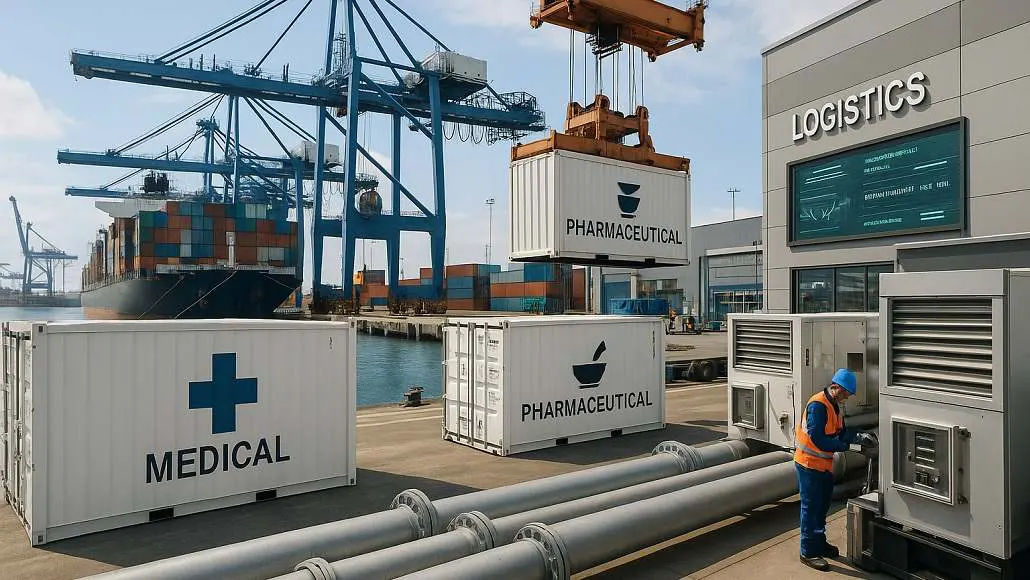The pharmaceutical industry is undergoing a profound shift as it faces enormous challenges in its supply chain operations. The recent global events, which include the COVID-19 pandemic, have highlighted the susceptibility that is inherent in pharmaceutical supply chains, leading to options that can prominently affect availability when it comes to critical drugs. Navigating the pharmaceutical supply chain disruption has become compulsory for stakeholders throughout the sector, thereby prompting a concerted effort by ports as well as heavy logistics companies to collaboratively come up with robust export infrastructure. Let us explore the major strategies for resilient logistics within the pharmaceutical supply chain, which highlight the critical role of compressors, optimized supply chains, and pipelines, and making sure of an uninterrupted flow when it comes to life-saving medications.
Supply chain disruption within the pharmaceutical sector
Pharmaceutical supply chain disruptions crop up because of various sources, which include transportation bottlenecks, manufacturing delays, regulatory alterations, and even shortages in raw materials.
As per a report by the World Health Organization, disruptions within pharmaceutical supply chains can lead to prominent public health barriers as patients may go ahead and experience delays when it comes to evaluating essential medications.
The pandemic has further underscored the susceptibility, thereby exposing the weaknesses within the inventory management, dependence on single-source suppliers, and also logistical inefficiencies. In response to these kinds of challenges, the pharmaceutical sector has gone on to recognize the requirement to elevate the resilience of its supply chain by way of developing proactive strategies. In order to navigate certain disruptions, stakeholders can very well safeguard against potential shortages and also make sure that patients get their medications in time.
Development of export infrastructure, collaboratively
A major strategy for navigating pharmaceutical supply chain disruptions happens to lie in collaborative development when it comes to export infrastructure. Ports as well as logistics companies are increasingly working together in order to elevate their capacity and create a more efficient flow of goods. This kind of partnership is very essential to make sure that medications reach their intended destination without any delays. Investing in advanced infrastructure like compressors and pipelines can significantly enhance the transportation of pharmaceutical products. Compressors are indeed vital when it comes to transporting gases as well as liquids, and their dependence is paramount in maintaining temperature-sensitive medications’ integrity. On the other hand, pipelines help with the safe as well as efficient movement of essential raw materials as well as finished products, which are very crucial in terms of dealing with pharmaceuticals as well as biologics.
For example, ports are embracing innovative tech as well as expanding their terminal capacities in order to get rid of congestion and also speed up the loading as well as unloading processes. By way of integrating these capacities, ports can very much lessen the turnaround times and decrease the risk when it comes to delays within the supply chain. These enhancements not only support the efficiency of shipping, but at the same time they also contribute to the total stability when it comes to pharmaceutical logistics.
The role technology plays in resilient logistics
In pursuit of navigating the pharmaceutical supply chain disruptions, technology happens to play a very transformative role. The integration when it comes to data analytics, the internet of things, as well as artificial intelligence enables pharmaceutical companies as well as logistics providers to gain real-time insights within their operations. This visibility is very critical when it comes to making informed decisions and also responding swiftly to market conditions, which keep on changing.
It is well to be noted that IoT sensors track environmental conditions during the stage of transportation, thereby making sure that temperature-sensitive medications are taken care of under optimal conditions. Data analytics help predictive modeling, thereby enabling the companies to evaluate potential disruptions and also devise contingency plans in an appropriate way. This level of preparedness not just elevates the operational efficiency, but at the same time, it also fosters dependence among stakeholders within the supply chain.
Besides this, advanced tracking systems, which are executed at ports as well as logistics hubs, offer stakeholders real-time updates as far as their shipment status is concerned. By way of using such technologies, pharmaceutical companies can proactively manage their inventory levels, decrease the likelihood of any kind of stockouts, and also make sure that medications are available when they are needed the most.
Coming up with diversified supply chains
Diversification happens to be another key strategy when it comes to navigating pharmaceutical supply chain disruptions. Depending upon a single source of raw materials or certain specific transportation routes can actually expose companies to risks that are very alarming.
By way of diversifying suppliers, as well as transportation options, pharmaceutical manufacturers can go ahead and establish a resilient supply chain that can withstand any kind of disruption. Establishing collaborations with multiple suppliers throughout different regions makes sure that companies have alternate choices of materials when faced with challenges. Moreover, logistics companies can discover favorite transportation routes in order to lessen the risks that are associated with any sort of congestion or political issues, thereby making sure that medicines reach the destination in the right way at the right time.
Practically, this kind of diversification may involve engaging with logistics partners having expertise within specific regions or coming up with alternative transportation methods like rail or air freight in response to any kind of disruption within the traditional shipping routes. By way of embracing a multifaceted approach, pharmaceutical companies can very much elevate their functional flexibility and also responsiveness to certain events.
Elevating communication along with collaboration
Effective communication as well as collaboration among stakeholders is essential when it comes to navigating pharmaceutical supply disruption. The capacity to share information in a seamless way among suppliers, logistics providers, as well as regulatory agencies can prominently enhance response times during crises.
A culture of transparency, along with collaboration, pushes alignment among all parties that are involved by making sure that challenges are addressed in a collective way.
Consistent communication with information sharing helps joint problem-solving efforts. When disruptions take place, stakeholders can, in a collaborative way, identify solutions in a quick manner, thereby minimizing the effect on the supply chain.
Making use of the digital platforms for real-time communication helps faster decision-making and also makes sure that all parties are equipped with required information in order to adapt to changing circumstances. Moreover, engaging in collaborative forecasting as well as demand planning along with suppliers as well as logistics partners can elevate overall supply chain visibility. By aligning anticipations and also enhancing information flow, organizations can plan more effectively for anticipated disruptions and also adapt their strategies as per the plan.
The Way Forward
Navigating pharmaceutical supply chain disruption happens to be a very crucial concern for the industry as it looks forward to making sure that there is consistent availability of lifesaving medications. By way of collaboratively coming up with export infrastructure, diversifying supply
chain, leveraging tech, and enhancing communication, pharmaceutical stakeholders can develop resilient logistics that can withstand any kind of challenges that are unforeseen. The proactive approach when it comes to passing through disruptions not just strengthens individual operations but at the same time it also contributes to the total stability within the pharmaceutical supply chain.
As the sector adapts to an increasingly intricate as well as interconnected world, fostering resilience within logistics is going to ultimately elevate patient outcomes and also support public health initiatives. In a spectrum that is defined by uncertainty, the commitment towards developing robust supply chain strategies is going to be essential in terms of delivering on the promise of healthcare solutions that are very effective.




















